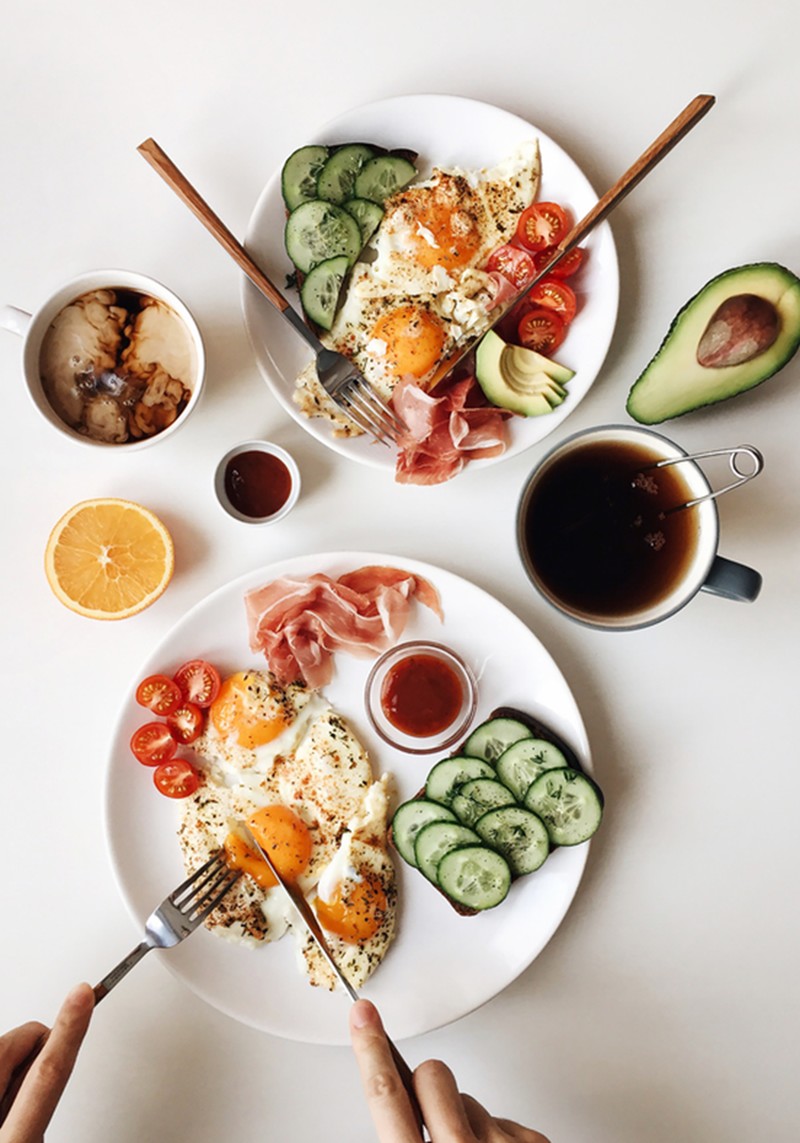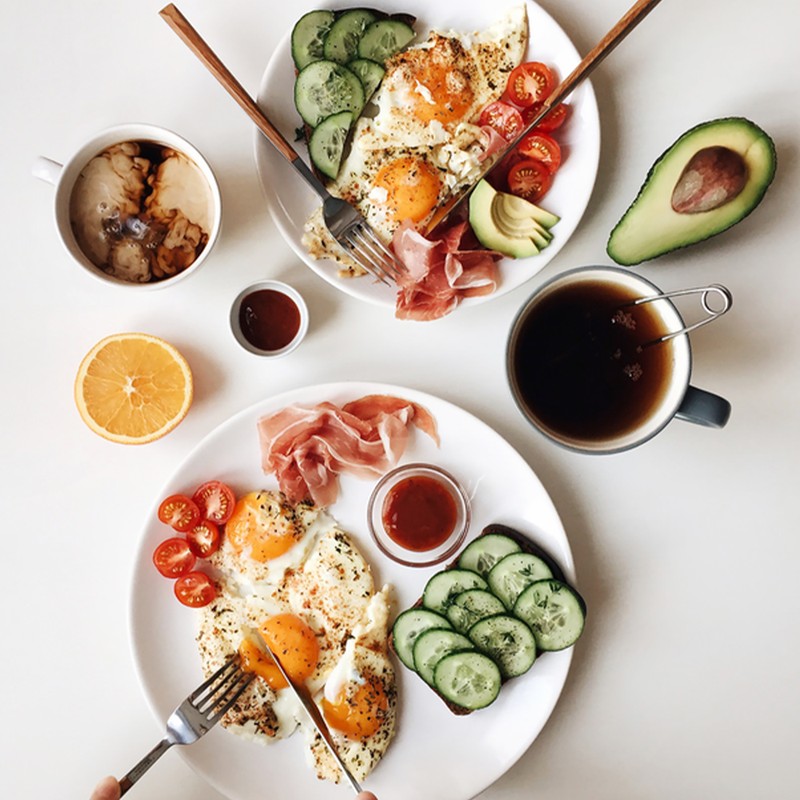9 Health Rules From A Pro

Eat More Veg
If you’re serious about improving your health, eat more colourful foods – eat fruit as a snack and sneak in two or three portions of vegetables with both lunch and dinner. This may sound like a lot, but you can make these taste great with different herbs, spices and sauces. Current guidelines suggest we should be eating seven to ten portions of fruit and veg per day, so if you’re currently at two or three portions, aim for four or five initially then gradually build up. In a critical review of the effect fruit and veg have on preventing chronic disease, the researchers concluded there was convincing evidence that high daily intakes of fruit and vegetables reduce the risk of developing hypertension, cardiovascular disease and stroke. The other upside to eating fruit, veg and other carb-based whole food is fibre. There is growing evidence to suggest almost half of colon cancer cases could be prevented by a more healthy lifestyle – and your risk of colon cancer could be reduced by up to 20% if adequate fibre is consumed. Aim for 25-30g per day.
Have Protein With Every Meal
Countless studies show high-protein diets are associated with better health and lower body fat. Main meals should always be rich in protein and fibre. This will help keep you full and reduce the likelihood of subsequent overeating, and also support overall health. Starting your day with protein is particularly important – omelettes, eggs on toast, Greek yoghurt and flavoured protein powder are all quick, easy, high-protein options with no faff. The reason protein is so great is because our bodies burn 25-30% of its calories during the digestion process. For every 100 calories of protein we eat, 70-75% are available to be used as energy or stored as fat, whereas for every 100 calories of fat we eat, virtually all are used as energy or stored as fat. Research shows eating 1-2g of protein per kg of bodyweight is beneficial for general health and fat loss.
Enjoy Your Favourite Foods
I’m not saying you should be eating McDonald’s, chocolate and donuts every day of the week, but banning them is terrible news for your mental health. These foods aren’t inherently detrimental to health anyway – it’s your overall diet that counts. In the context of your life, individual eating episodes are insignificant. You won’t gain fat by eating one donut or adding a spoonful of sugar to a drink, or even from consuming a 50g bag of sweets three times a week. The same goes for takeaways – don’t even think about trying to make it healthy. Order what you want, enjoy it and move on. You can absolutely enjoy your favourite takeaway in moderation and still support your health.
Booze Isn’t That Bad
In the health conversation, alcohol gets a bad rap but it’s not terrible. If you enjoy a few glasses of wine or pints of beer each week alongside a supportive diet with exercise, then alcohol consumption absolutely fits into a healthy lifestyle. But, if you’re going out three times a week and drinking heavily, this will impact your overall health. The key to understanding how our choices impact our health is seeing them in the context of a week, a month or a year, not a single day.
Forget The Number On The Scale
Each time you step on the scales you are measuring your body fat, but also your bones, water, food and muscle. Your bones will likely stay the same weight, while muscle gain or loss won’t tend to show much difference from day to day. But when it comes to water this weight can fluctuate massively each day depending on what you’ve eaten. This is why when slimming clubs weigh their members weekly, they are administering success or failure based on someone’s entire mass, not just their body fat. Over a long period of time the number on the scales will indicate losses or gains in body fat as other weight variables level out. But in the short term it’s a poor barometer. Taking photos every couple of weeks is a more accurate way to measure short-term changes in body fat and removes you from the mental torture of basing your self-worth on a number that doesn’t even measure what you want it to.
Don’t Avoid Carbs
Anyone who deems carbs to be inherently bad for weight loss or maintenance isn’t looking at the body of science. Sure, if you reduce carbs, you will likely create a calorie deficit, which is why you may lose weight. But why not just create a calorie deficit while including foods you enjoy? A few decades ago, there was an experiment where participants only ate a few hundred calories of rice, fruit and fruit juice (all carbs) for a long period. The result was that participants lost a combined total of 63.9kg. If carbs made us fat or stopped us from losing fat, how on earth did this happen? The answer is: carbs don’t make us fat and the participants lost weight because they created a calorie deficit.
Think Weekly, Not Daily
If you want to lose a few pounds, it’s worth thinking about your calorie intake from a weekly not daily perspective. Let’s say your target is 2,000 calories per day for fat loss. Over seven days, that equals 14,000 calories. But instead of trying to achieve 2,000 calories every day, what about trying to achieve 14,000 calories across seven days? Spreading your calories in this way won’t change the numbers you have to aim for, but it gives you more flexibility. You can enjoy calorie-dense social occasions, knowing you can rein back calorie intake across other days to stay on track. Think about it like a sports team: you don’t win championships with one victory; you need many individual victories over a long period. You may also lose some matches, but that doesn’t mean you’ll lose the championship. There’s no pressure because there’s always another opportunity around the corner.
Move More
You’ve heard this one before, but moving more is the secret to being in better health. But it’s not all about the gym. The technical term for this is non exercise activity thermogenesis (NEAT) – this is the energy we burn without planned exercise, such as fidgeting, household chores, or just walking around. This unplanned and subconscious movement accounts for 15% of our total daily energy expenditure, which is actually pretty high. I’m a big fan of NEAT as it provides an easy way to chip away at your fat loss goal. Whether it’s increasing steps or moving in other ways, you’d be surprised at how much these simple increases add up over time to support your goal with minimal upheaval to your life. Instead of dreading a beastly PT session, how about aiming to achieve 10,000 steps per day, which equates to roughly 1.5-2 hours of walking. One study found that people with an active lifestyle could burn 2,000 more calories per day without planned exercise.
Going Vegan Isn’t Necessarily The Answer
If you previously had a diet high in processed, low-quality food, then switching to a vegan diet will likely benefit your health. But if you already eat an abundance of plant-based foods like fruit and vegetables, along with nutritious sources of lean meat, fish, eggs and dairy, going vegan might worsen your health as you’re removing many vitamins and minerals from the animal-based foods. As a rule of thumb, we should all be striving to eat as many plants as we can, but animal products certainly support our health too.

The Fitness Chef: Lose Weight Without Losing Your Mind by Graeme Tomlinson (Ebury Press, £16.99) is out now. For more, head to FitnessChef.uk and follow @TheFitnessChef_
DISCLAIMER: Features published by SheerLuxe are not intended to treat, diagnose, cure or prevent any disease. Always seek the advice of your GP or another qualified healthcare provider for any questions you have regarding a medical condition, and before undertaking any diet, exercise or other health-related programme.
DISCLAIMER: We endeavour to always credit the correct original source of every image we use. If you think a credit may be incorrect, please contact us at [email protected].


